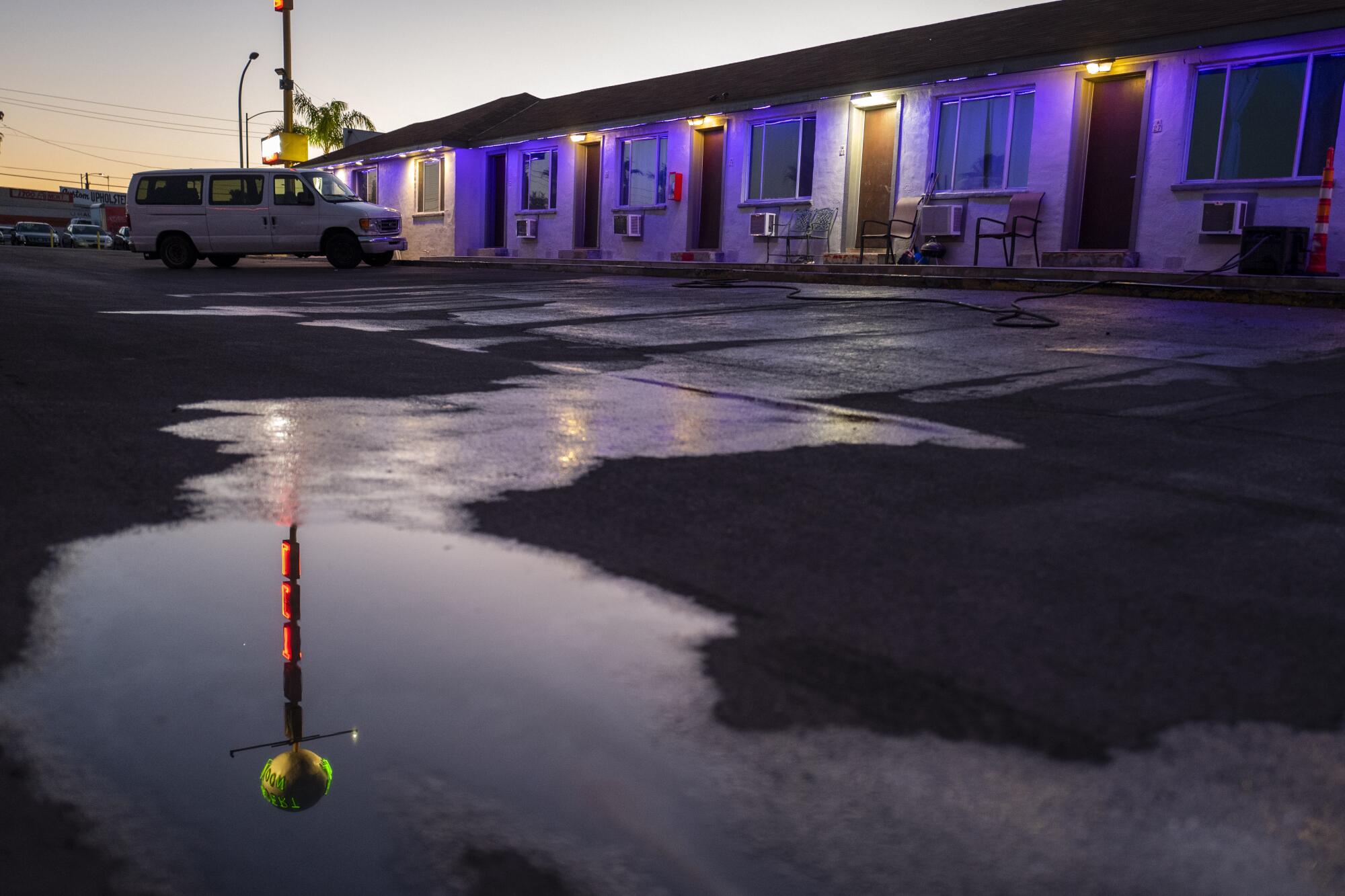
- Share via
LAS VEGAS — Jake Crandall took a deep pull from his vape as a woman emerged from the darkness of Fremont Street and into the parking lot of the Desert Moon Motel. She gripped the final $20 she owed him.
“Here you go,” she said. He didn’t ask how she got it.
“Thanks,” Crandall, the property manager, replied. “We will figure it out again tomorrow.”
It was just after 9 p.m., and since she had now paid the full daily rate — $57 — Room 5 would again be hers for the night, a welcome reprieve from the woman’s other option: the back seat of her red Pontiac sedan. Crandall knew the woman, who asked that her name not be used because of the sensitivity of her situation, didn’t have anywhere else to stay.
For much of the last week, she and her two teenagers, both autistic, alternated between sleeping at the motel or inside the car. The 45-year-old woman said she lost her one-bedroom Los Angeles apartment early in the COVID-19 pandemic. Ever since, she’s been traveling back and forth between Los Angeles and Las Vegas, staying with family when she can.
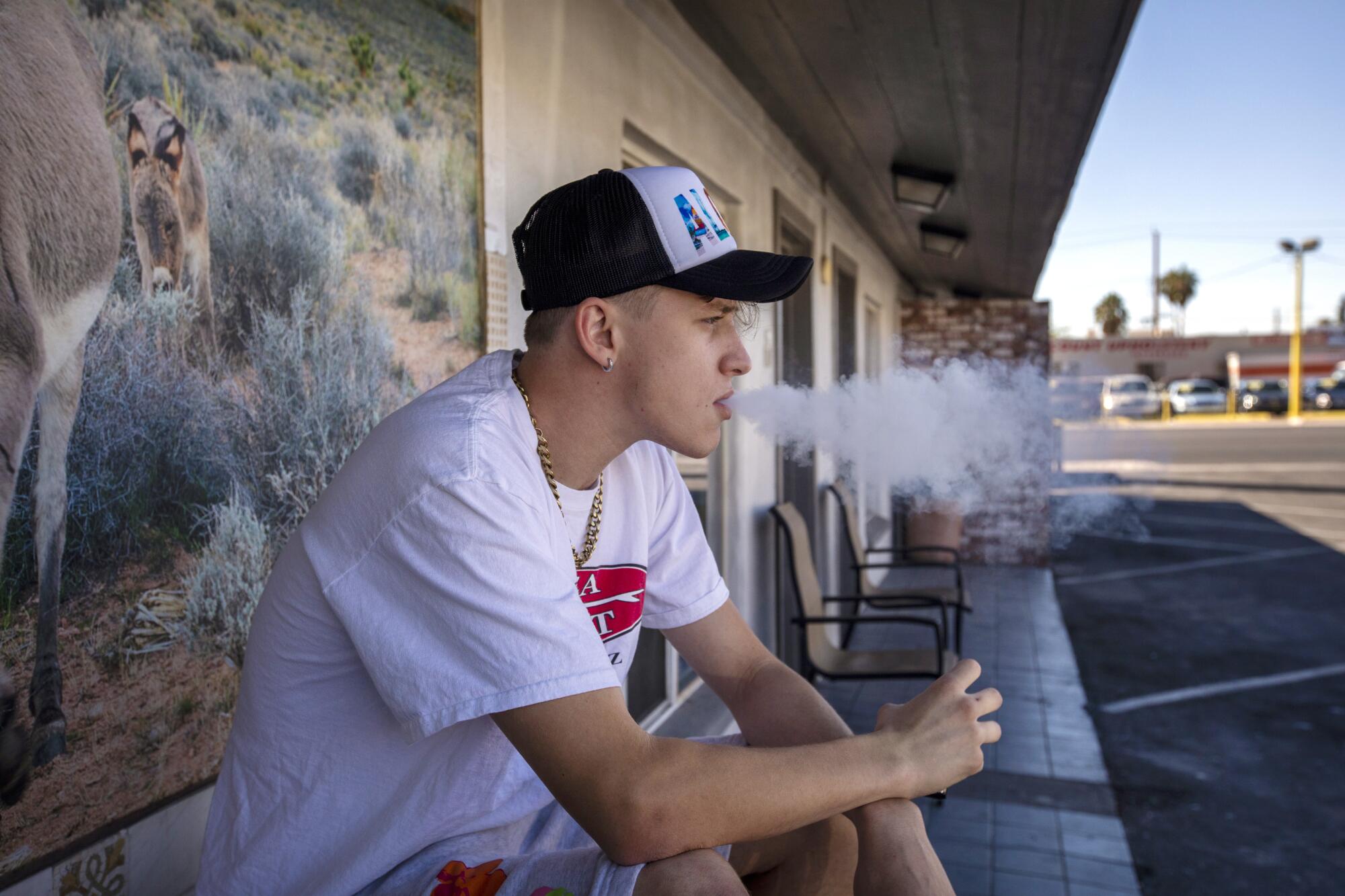
Crandall, a 19-year-old self-described beatnik in his gap year who recently moved from Santa Cruz, runs the day-to-day operations at the Desert Moon for his uncle, who owns the aging, 30-room motel. If you stand in the parking lot and look out at the horizon to the west, you’ll spot the red glow of Resorts World Las Vegas, the $4.3-billion tower that opened in June, a reminder of the moneyed Las Vegas that feels so far away.
Almost everyone Crandall meets at the Desert Moon is in a difficult situation.
Half are here because their room is covered by nonprofit groups using federal pandemic assistance dollars. Others pay the nightly rate by donating plasma or pawning stereos and tools that are stored in their cars. Some sell their bodies.
“This motel is the last stop for many,” Crandall said. “It’s either here or the streets, and a lot more people have had to face that decision ... with this pandemic.”
For tens of thousands of Americans nationwide, mostly in large cities, the ongoing health crisis, slow economic recovery and expiration of the federal and state eviction moratoriums have forced them into motels such as the Desert Moon.
The Supreme Court in late August struck down the Biden administration’s moratorium on evictions that was set to expire Oct. 3, and Congress has yet to pass measures to reinstate it.
Las Vegas: The Road Back
This is the second in a series of occasional articles about Las Vegas emerging from the COVID-19 pandemic.
About 10 million Americans remain behind on their rent, according to a recent analysis by the Center on Budget and Policy Priorities, a Washington think tank.
In Nevada, a state moratorium expired in May, but the federal protections continued to keep tenants from getting kicked out simply because they couldn’t afford to pay their full rent. Landlords, however, could nonetheless pursue evictions here under certain circumstances, including for lease violations such as too many pets or extra tenants. Gov. Steve Sisolak in recent months signed legislation that says tenants cannot be evicted for nonpayment of rent as long as they are actively pursuing rental assistance. But finding those resources can be difficult.
Since March 2020, there have been more than 35,000 eviction filings in Clark County, where Las Vegas is located, based on research by the Eviction Lab at Princeton University, and officials here estimate that statewide as many as 140,000 households are at risk of eviction.
Everyone deserves a roof over their head. People deserve dignity and respect.
— Kelly Robson, social services officer with HELP of Southern Nevada
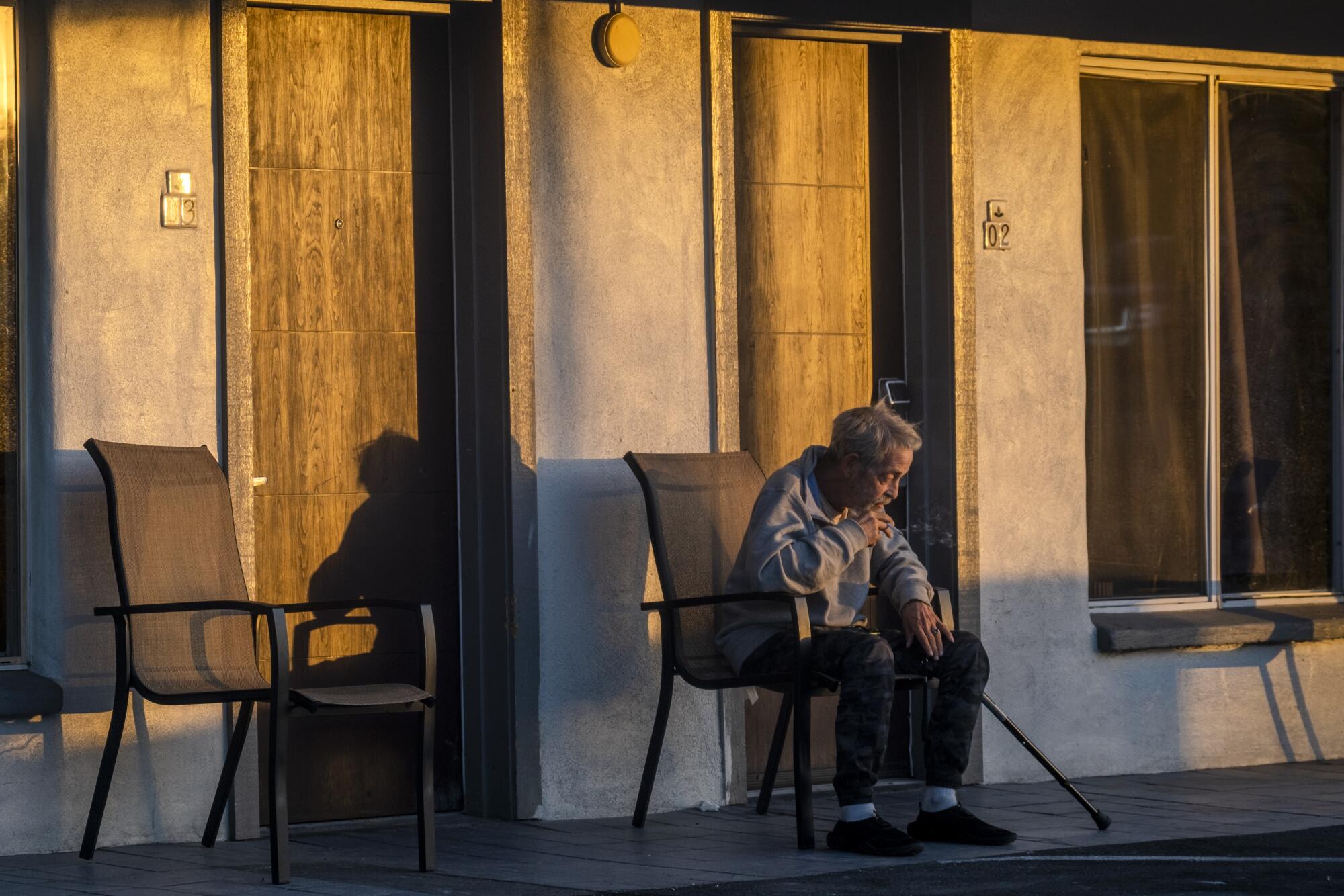
California’s moratorium expired in late September, and about 744,000 households owe an average of $3,500 in back rent for August alone, according to an analysis by the nonprofit PolicyLink and the USC Equity Research Institute.
Several federal agencies, such as the Department of Education, consider people to be homeless if they live in motels. In 2020, roughly 13,000 out of 324,000 students in the Clark County School District were listed as homeless, including nearly 2,000 living in motels.
The reality of evictions, experts say, is that for the immediate future, people are often left to choose among a shelter, a weekly or extended-stay motel or the streets.
“These individuals are working or looking for work and they just cannot earn enough money to live in an affordable place,” said Nicholas Barr, an assistant professor of social work at the University of Nevada, Las Vegas. “It’s destabilizing to the community and social fabric.”
For some, the Desert Moon serves as a respite.
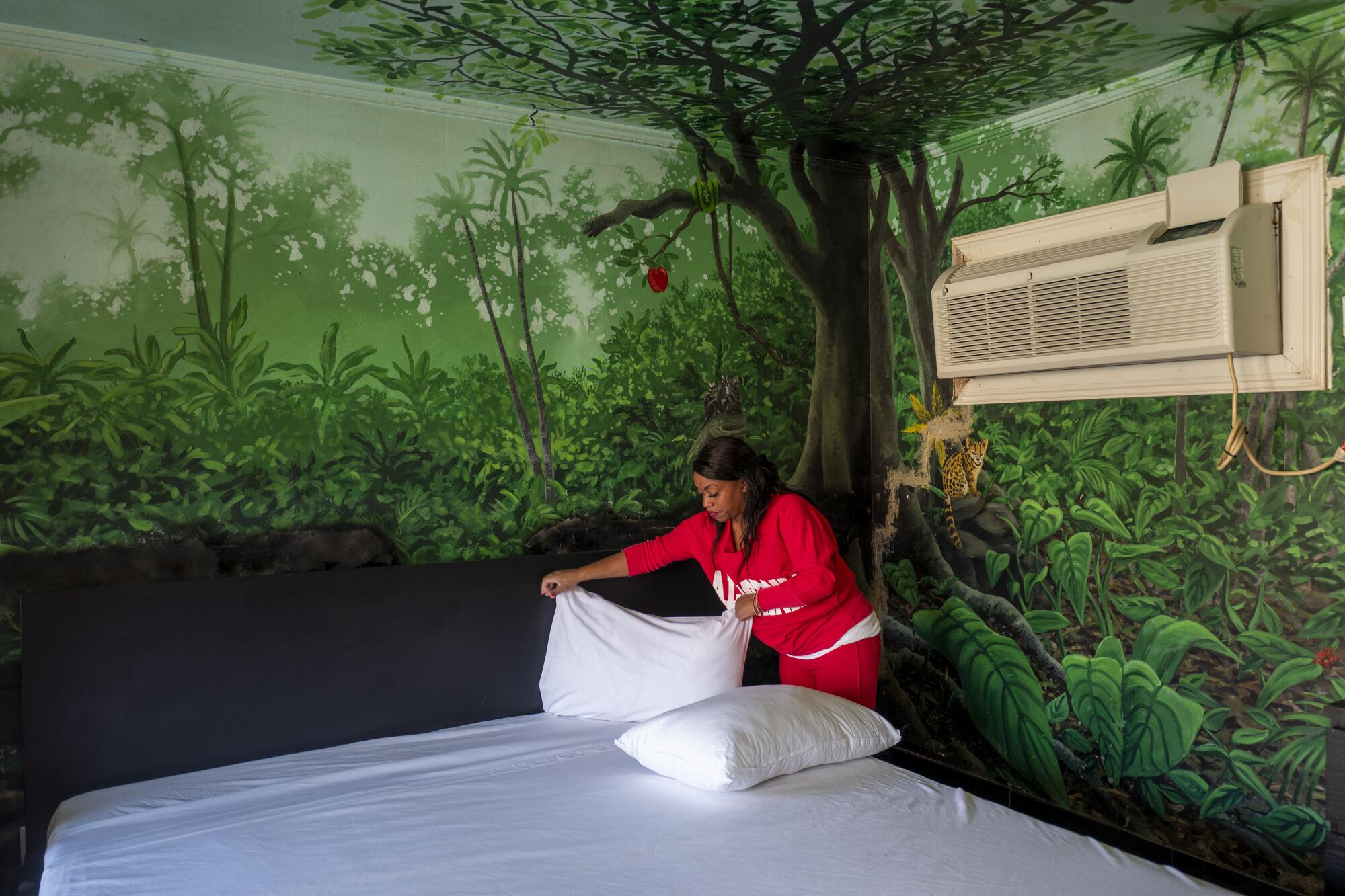
The 1930s-era motel sits 12 blocks from downtown Las Vegas’ Fremont Street Experience, where on a recent night Barenaked Ladies played before thousands and the area radiated with its typical frenzied energy fueled by yardstick-length drinks, an ever-present plume of now-legal marijuana and the buzz that comes with thinking of the next card hitting blackjack.
But all was quiet at the Desert Moon.
These days it serves as home to several people who lost their housing during the pandemic. Some are working odd jobs, scraping together the $57 nightly rate, and others have had their cost covered by nonprofit groups that are using federal aid.
They are individuals with children and people reaching retirement age and now unhoused. Some live here among addicts who manage to gather enough for a night or two of privacy and go on meth- or heroin-fueled benders. Crandall says he tries to keep them out.
“This is a residence for a lot of people,” he said. “Most are trying to get on their feet and survive.”
::
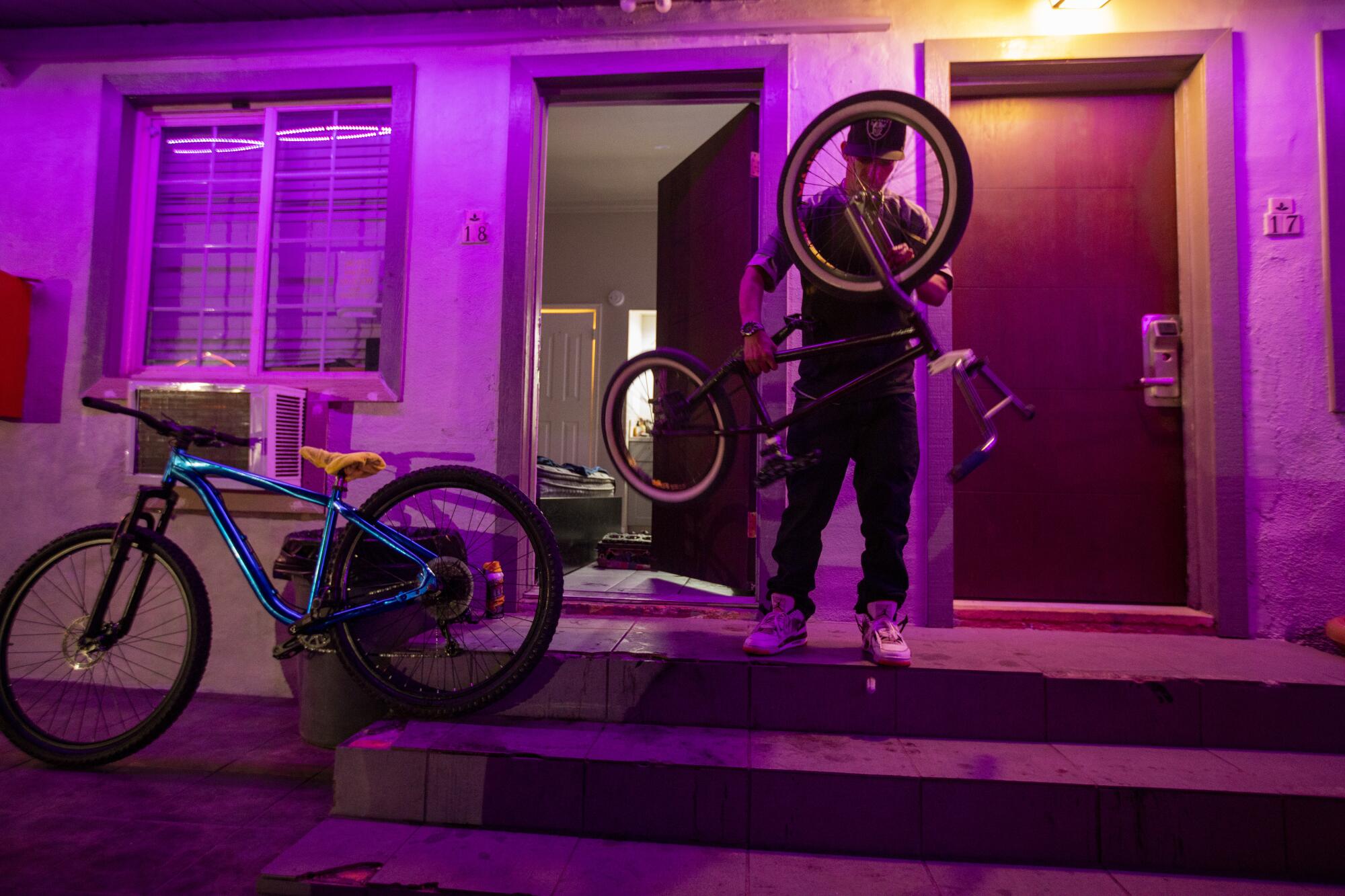
For a while, the 2003 Honda Odyssey minivan parked outside Room 18 was home for Mario Arciga and Adriana Sanchez and their nine kids. But these days, the couple and their children, who range in age from 5 to 16, live in three rooms toward the back of the motel, paid for by a nonprofit. The family has a view of an alleyway with two large, blue dumpsters. On the other side of the receptacles is a line of tents of homeless people.
“We are grateful to be here and not in the alley,” said Arciga, 33. “We were not far away from that.”
Arciga and Sanchez sleep separately so they each can be in one of the rooms with the younger children. Their eldest son stays in the third room.
“We all have to watch out for each other,” said Sanchez, 32.
The couple, childhood sweethearts who met in Riverside, moved to Las Vegas a decade ago for a fresh start.
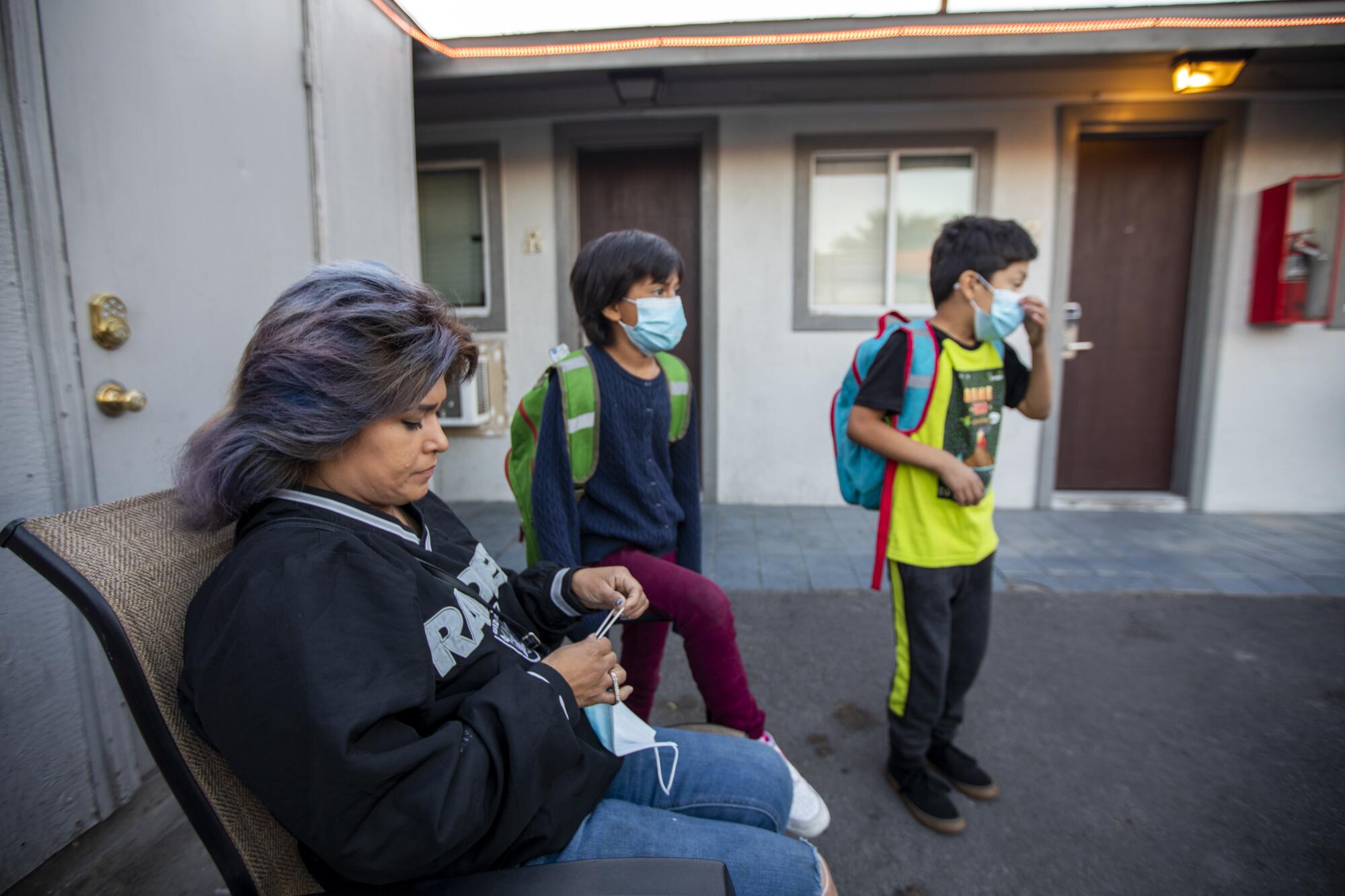
For much of his life, Arciga has worked as a mechanic, specializing in Hondas. He had jobs at several shops here, but in the year before the pandemic he’d started growing his own clientele and traveling between houses fixing cars.
Money was picking up — he was making nearly enough to cover the $650 monthly rent the family paid at a trailer park. But the consistent work evaporated when the pandemic arrived.
He struggled to make payments. In the early months, he asked people to stop by his trailer so he could fix their cars in his driveway. But then neighbors started to complain.
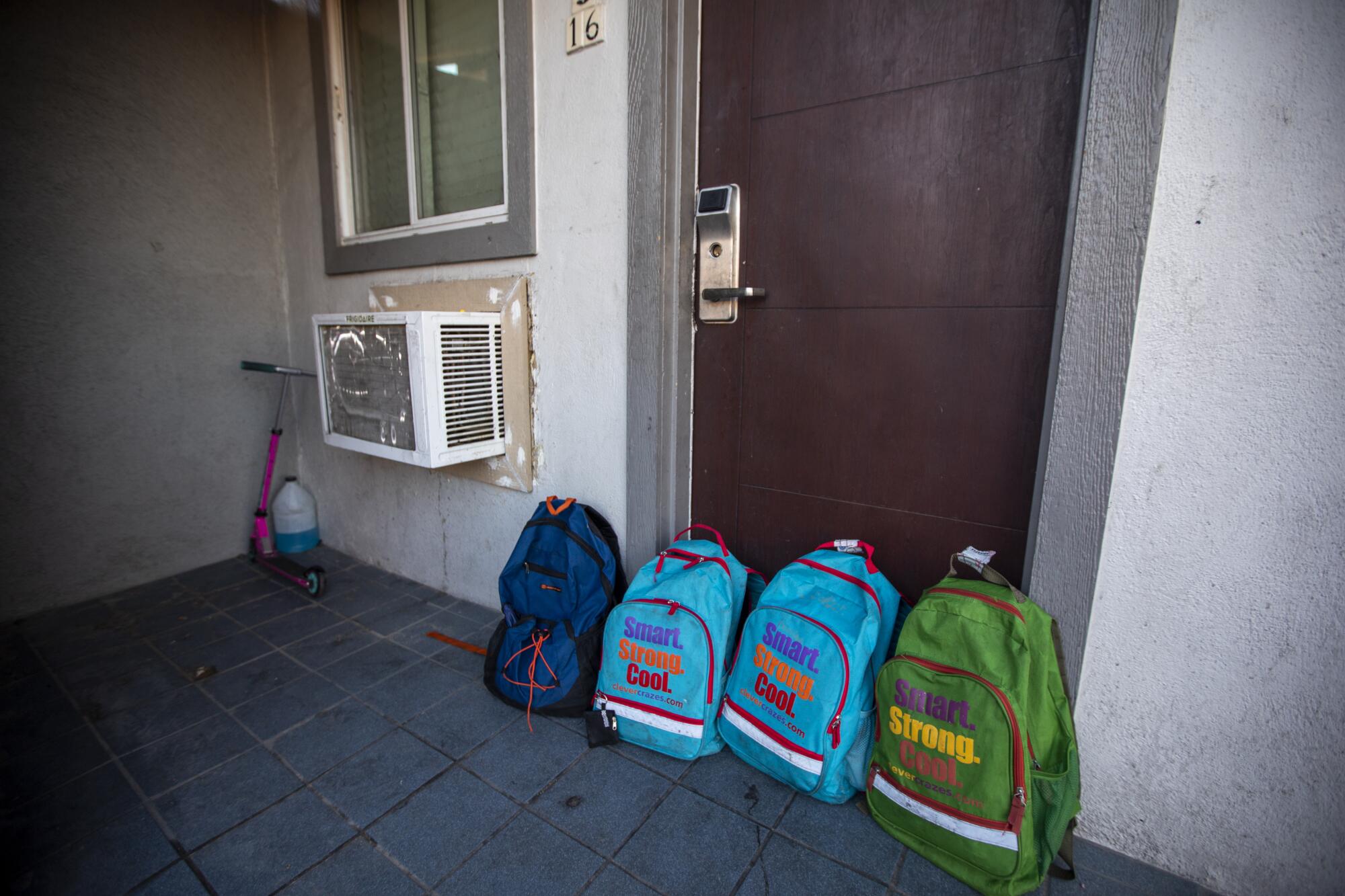
In June, after the state eviction moratorium expired, the landlord told Arciga that due to the complaints and months of unpaid rent, they had to leave.
“Boom, we were out,” Arciga said.
He and Sanchez had some money saved and put items in storage — clothes for the kids, appliances, tools — and lived with relatives for a bit. But space was tight and soon they were all inside the minivan. They slept in Del Taco parking lots and often visited libraries so the kids could stay up to date on schoolwork.
“We were hopeless,” said Sanchez. “But we had each other. ... We have each other.”
The couple found assistance in July through HELP of Southern Nevada, a nonprofit that works to get people into shelters and motel rooms and off the streets.
“A room is much better than the van,” Arciga said on a recent morning outside Room 18. The couple’s 9-year-old twins circled the Odyssey on scooters, giggling in the warm morning sun.
“We cannot go back to living in that van,” he said.
These days, Sanchez scrolls job listings on her phone and cares for the kids. She takes them to school near where they used to live — a 15-minute walk to the city bus stop from the motel and then a 30-minute ride.
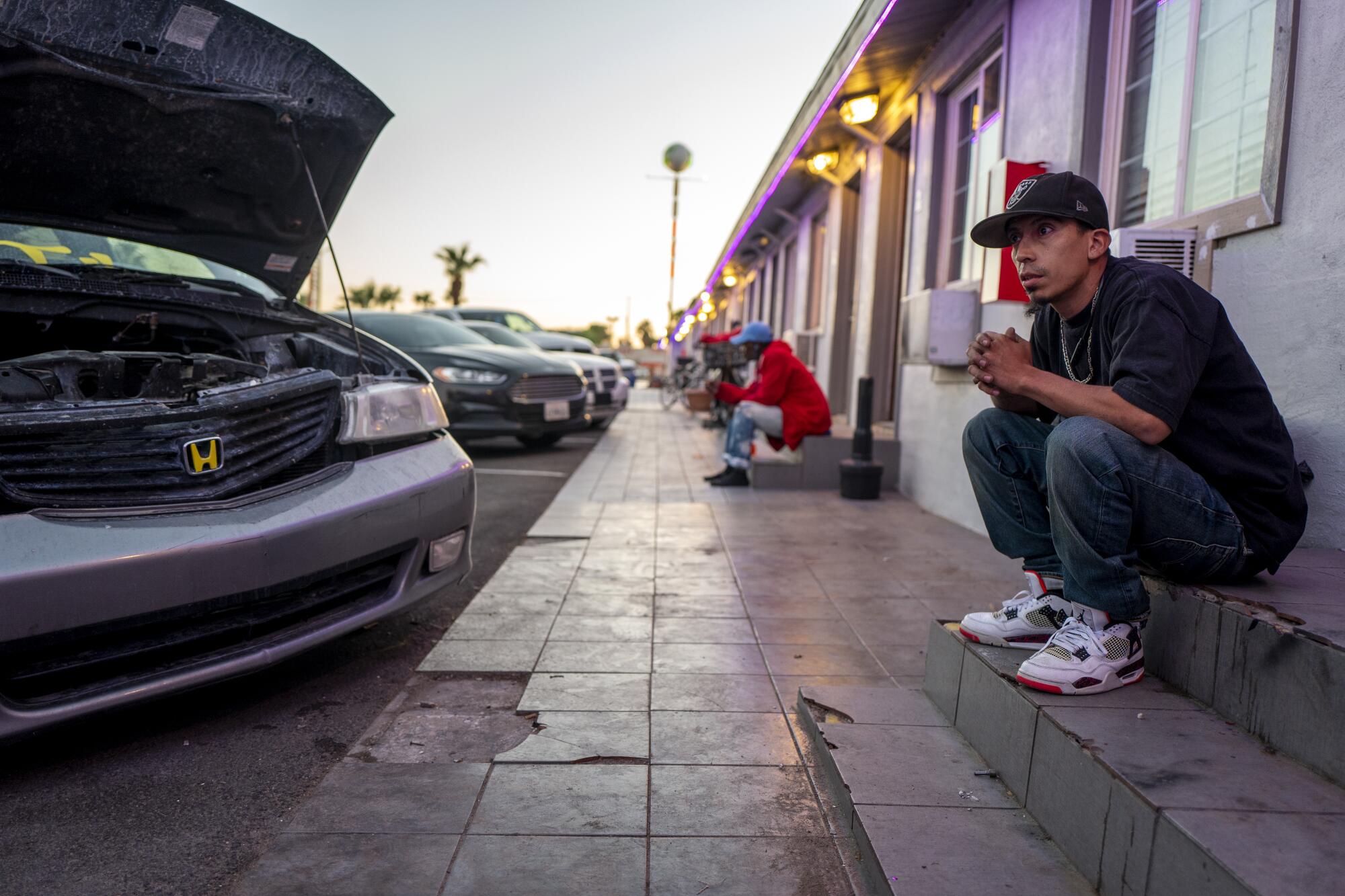
While the kids are in class, Arciga works on Hondas in the motel parking lot and fixes bicycles. Business has started to pick up, and inside one of the family’s rooms there are screws and a car jack next to a door. The smell of grease from engine parts fills the room.
“This would usually be in a garage or outside,” he said. “But we don’t have space. … We hope for space in the future.”
Each week, outreach coordinators come to the motel and pay Crandall a weekly sum for the rooms that Arciga, Sanchez and others live in.
Kelly Robson, the group’s chief social services officer, said the number of people hoping to access services has doubled since before the pandemic. Every day, she said, the nonprofit receives at least a dozen emails from people inquiring about rental assistance — and that’s on top of the requests that come in via phone.
From March to December 2020, HELP doled out $3 million in federal funds to keep people housed in their homes or places such as the Desert Moon for several months. Since March of this year, it has spent $434,000 on motel stays.
Other groups such as the Nevada Housing Coalition and HopeLink of Southern Nevada provide similar assistance to families who have been evicted and are now homeless. The money is part of the CARES Housing Assistance Program, or CHAP, that assists residents of Clark County.
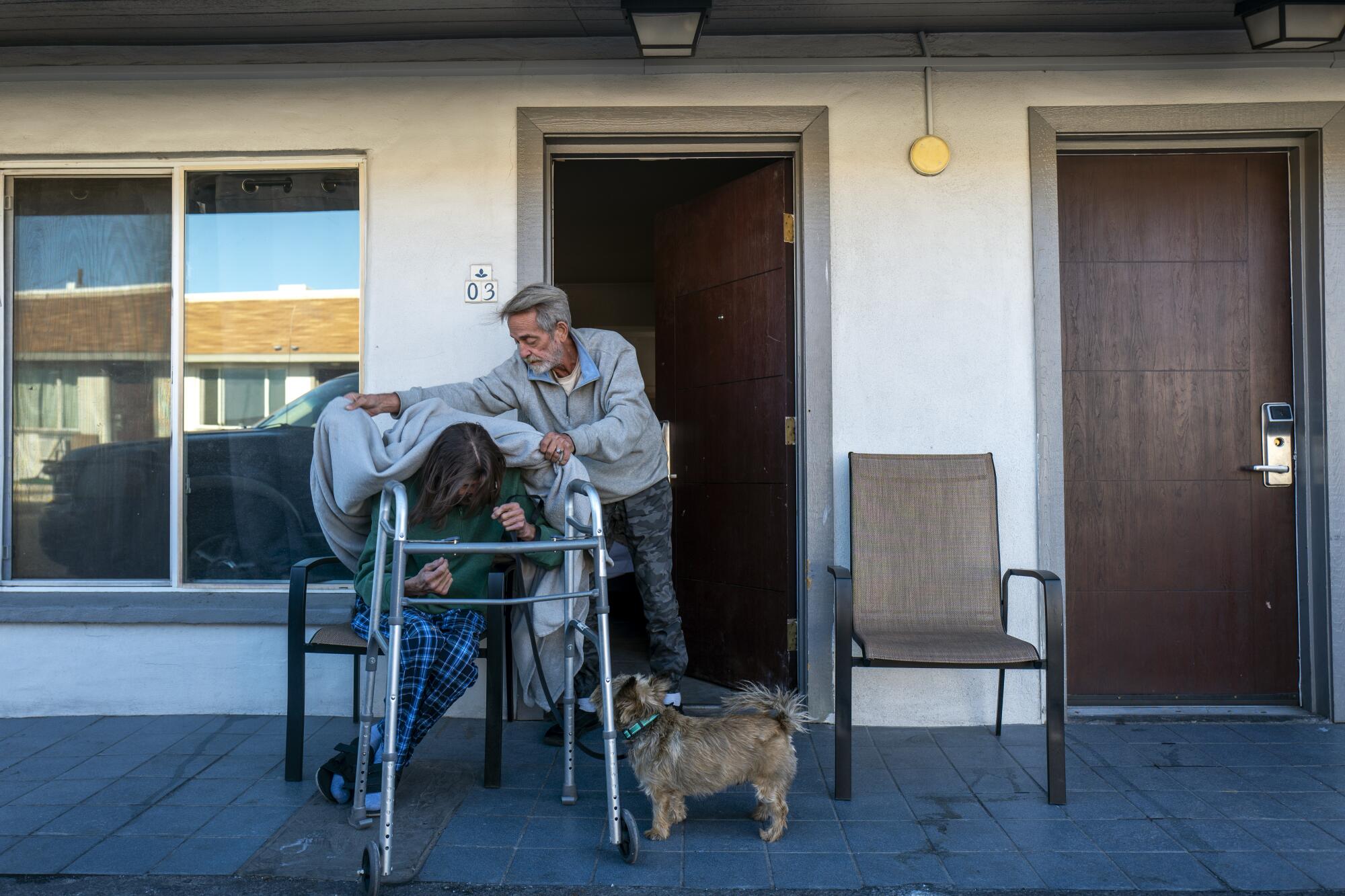
“Everyone deserves a roof over their head,” Robson said. “People deserve dignity and respect.”
Many of the clients she works with receive Social Security Disability benefits, which usually provides $794 a month. And the fair market monthly rent for a one-bedroom apartment in Las Vegas is about $1,000, she said. (The apartment rental vacancy rate in Las Vegas has hovered near 4%.)
“The math doesn’t add up,” she said.
Robson said that HELP of Southern Nevada serves tens of thousands annually and that on a recent weekday morning 951 people woke up in a bed funded by the nonprofit. The group usually avoids inexpensive hotels on the Strip with casinos where gambling and free alcohol can be enticing and resort fees add to the nightly price, Robson said.
::
On a recent morning, Crandall walked from room to room delivering check-out notices. The motel sometimes keeps a handful of rooms vacant and posted on travel websites at a higher price on weekends when big shows are downtown.
“People will sometimes come, see the place, then peace out really fast,” said Crandall, who before taking the job was traveling the U.S. in his white Ford E150 van. After graduating from a private high school, he lived near Zion National Park for a bit, before starting work here off Fremont Street. He now sees people at their lowest points in life.
“It’s depressing,” he said. “To not know where you’re going to sleep night in and night out.”
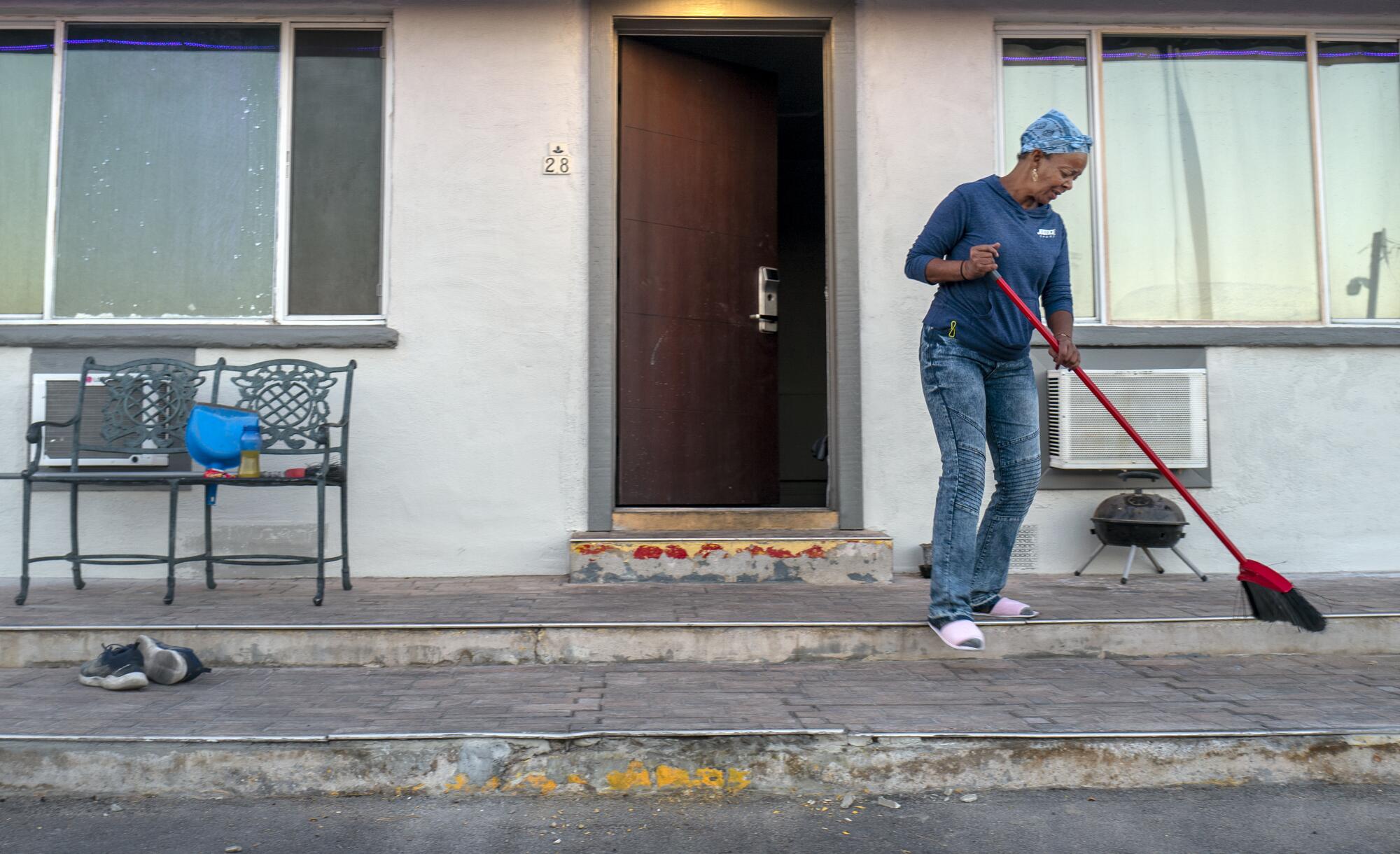
As he walked between rooms, Karla John folded sheets in Room 28.
The 60-year-old, who became homeless for the first time in her life during the pandemic, is getting assistance from HELP of Southern Nevada, for the room she shares with her husband, Shaun. The couple has lived here since June.
A retired U.S. Air Force veteran, John rented a house for two years near Nellis Air Force Base here. She served in the 1991 Persian Gulf War and retired from the Air Force in 1996. When she moved to Las Vegas from Dallas in 2012 she worked several jobs. More recently, she managed a motel where she earned a little more than minimum wage.
She became homeless in June when her landlord lost the house she rented. She has struggled to get answers about why the house was seized, but she and her husband packed their belongings into a U-Haul. They had little savings for a new place, so they parked the U-Haul at city parks and slept in it.
“It was one of the worst situations I’ve ever been in,” she said.
John receives about $1,100 a month from the Air Force, about 75% of benefits, she said, which will max out when she turns 62.
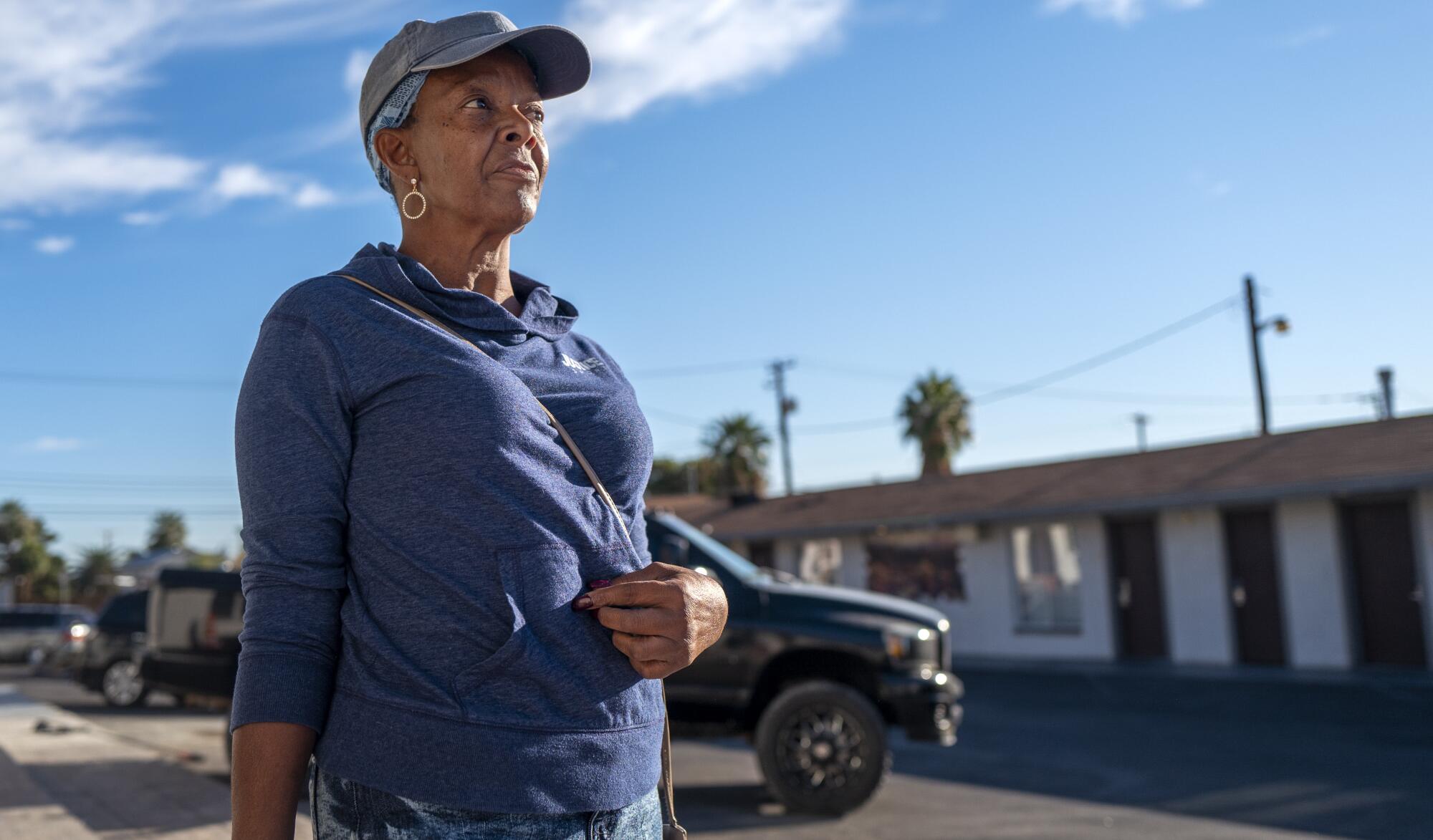
She does laundry and helps with housekeeping in the rooms here at the Desert Moon to earn a little extra money. She folded clothes on a recent afternoon and thought about her future.
“How can this be that in America we have people just living on the streets and no one cares?” she said. “Veterans who have fought and nearly lost their lives, now just tossed to the margins.”
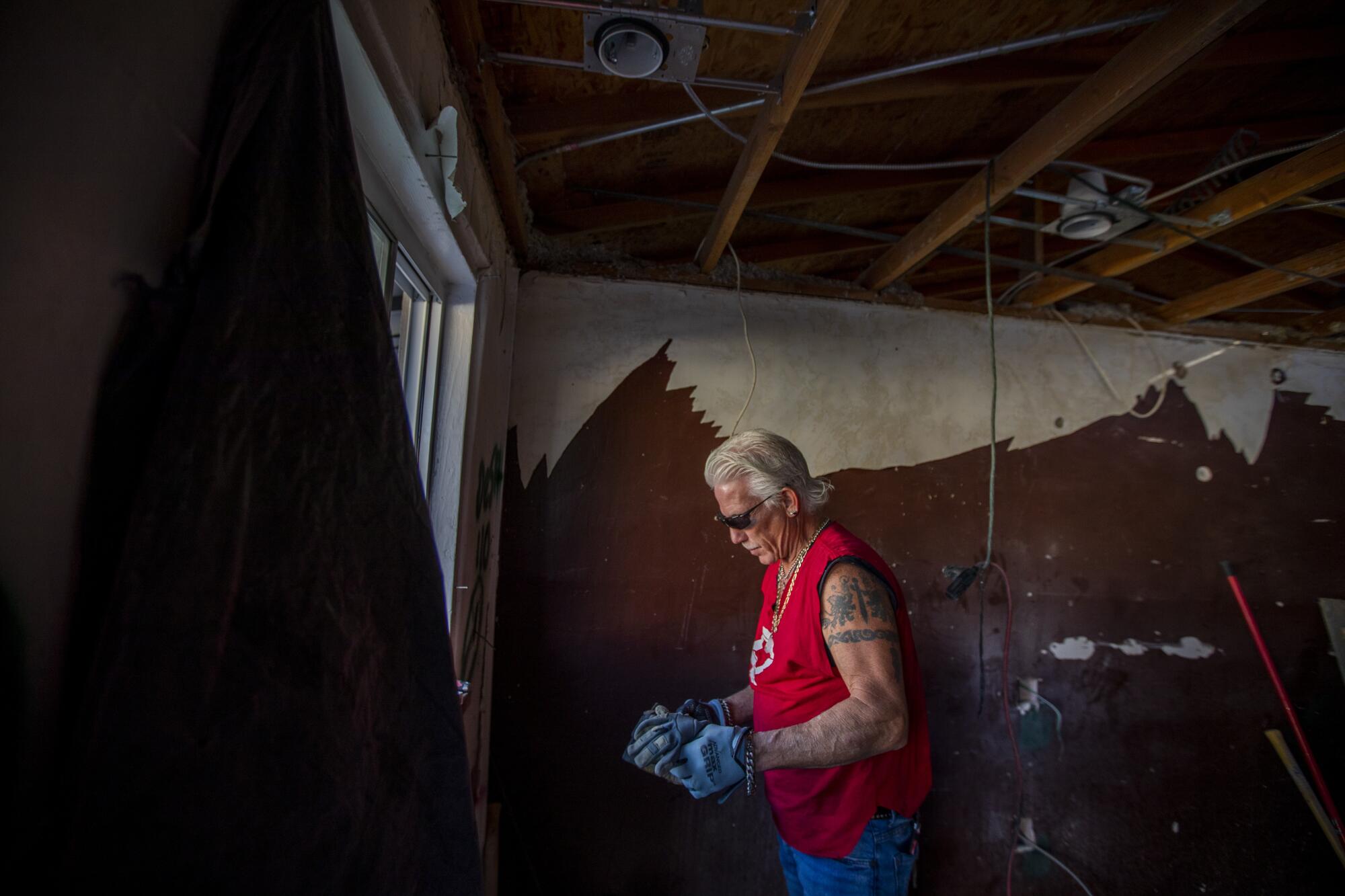
Another motel dweller, Erik Ausband arrived around two months ago. He does odd jobs and has advertised for carpentry work on websites for gig workers.
He lost his trailer early in the pandemic when he couldn’t make his $600 rent. Ausband didn’t know about a moratorium, he said, so when the landlord said he needed to leave, he moved out.
He stayed in a buddy’s extra trailer in Pahrump, a 60-mile drive west of Las Vegas. He lived there until the spring, then began living out of his Hyundai Santa Fe.
Since August, he’s lived in Room 24.
Ausband, 56, who has a deep Southern drawl that dates to his life in Tennessee and Georgia, does maintenance around the motel, and Crandall’s uncle pays him a stipend and gives him deals on rent. He does a lot of jobs around the complex — fixes shower heads and AC units. In his down time, he scrolls county and government websites trying to get pandemic unemployment assistance he’s owed.
“The websites are slow, confusing,” Ausband, who wears several gold chains, said on a recent afternoon as he took drags of a Marlboro on his break.
Inside Room 24, he has a workbench, drills and a ladder. A case of Budweiser rests near a refrigerator. His pug, Roady, roams the property yelping at other dogs.
“Now I have this room, which is more than enough right now,” he said.
On a recent evening, as cars whirred past on Fremont Street, the neon sign of the motel — save for the darkened letters M and O — lighted up the parking lot. One of Arciga and Sanchez’s daughters sat on the steps outside a room viewing a movie on a cellphone. John’s door was slightly ajar, enough to see her watching television. Ausband was gone, but Roady yipped from inside the room.
For the last three nights, Crandall had to call Las Vegas Metropolitan Police for incidents involving customers not tied to the nonprofit. First, a man had a mental health crisis and broke the television, then a woman slapped her boyfriend, and on the third night a woman had tried to solicit sex from her room.
“There is a lot of humanity,” Crandall said. “No matter what, we are all going through something, always.”
Along Fremont, a group of young men marched toward downtown in collared shirts and jeans carrying cans of beer. The Strip glowed in the distance.
It was still early and Crandall settled into a lawn chair. He took another pull from the vape and waited for what was ahead.
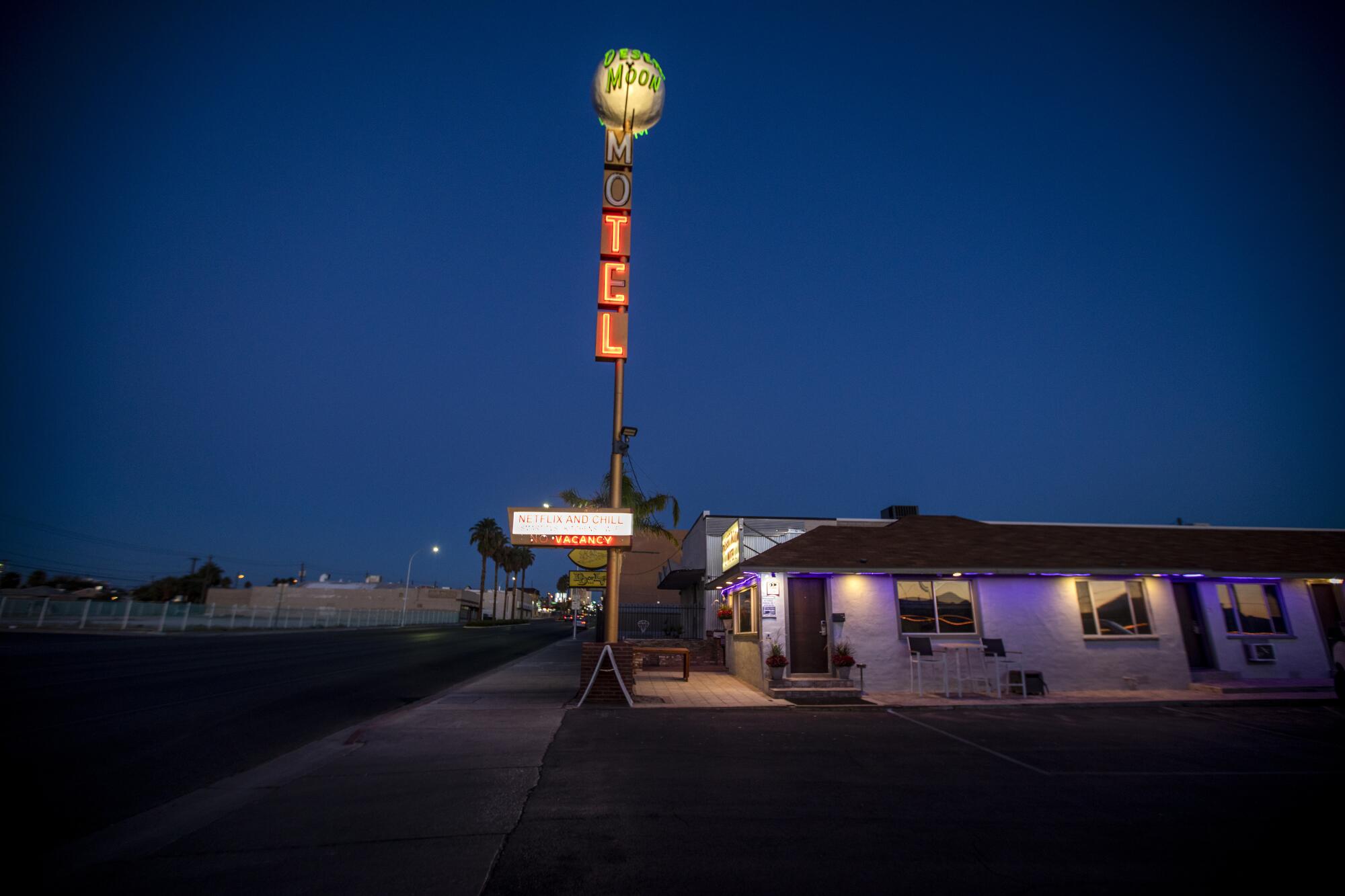
This is the second in a series of occasional articles about Las Vegas emerging from the COVID-19 pandemic. Here is the first.
More to Read
Sign up for Essential California
The most important California stories and recommendations in your inbox every morning.
You may occasionally receive promotional content from the Los Angeles Times.












